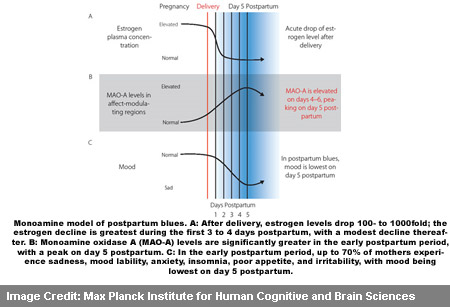70 percent of women face symptoms of baby blues within the first week after giving birth according to experts. They reveal that though most women recuperate quickly, 13 percent of all new mothers suffer from symptoms of a clinical-level postpartum depression. Postpartum blues could be a major risk factor for developing postpartum depression and its symptoms can be viewed as a prodromal stage for postpartum depression.
Postpartum depression is a major oppressive episode that starts within 4 weeks after delivery and is an essential public health problem. Increase of the enzyme MAO-A throughout the female brain occurs in the immediate postpartum period. These findings were put forth by Julia Sacher from the MPI for Human Cognitive and Brain Sciences in Leipzig and her colleague Jeffrey H. Meyer from the Centre for Addiction and Mental Health in Toronto, Canada.
Giving birth to a baby is one of the most laborious but also a memorable day in women’s lives, nevertheless almost three quarters of all women feel low immediately after delivery. They experience tremendous sadness, mood swings, anxiety, sleeplessness, loss of appetite and irritability. Reasons for these have not yet been known however in the first three to four days after giving birth estrogen levels drop 100 to 1000 fold.
Recent investigations reveal that relative to estrogen-loss, levels of the enzyme monoamine oxides A (MAO-A) increases throughout the female brain. The enzyme is found in greater quantities in glial cells and monoamine releasing neurons. It fragments the neurotransmitters serotonin, dopamine and norepinephrine. These neurotransmitters influence our moods as well as they are responsible for passing signals between nerve cells.
Using positron emission tomography experts evaluated the distribution of a radioactively distinct ligand in the brain. This distinctively binds and has high similarity to the enzyme monoamine oxidase A. Levels of MAO-A were 43 percent higher among women who just had a baby as compared to the control group which included women who either had children long time ago or had no children. The MAO-A increase was noticed in all brain regions and it was the highest on day five postpartum. These findings reveal that mood of mothers is lowered specifically on this day.
Experts observed that severe baby blues are viewed as a prodromal stage for postpartum depression. Therefore preventing depressive symptoms may have a strong impact for prophylaxis of postpartum depression. These depressive symptoms mainly exist in the postpartum period. Attempts may be made in order to reduce the increased levels of MAO-A with the help of antagonist drugs or increase the quantity of monoamine neurotransmitters that mainly lift up the mood. Both these factors try keeping levels of monoamine neurotransmitters present in the brain leveled after birth.
It is essential to come up with treatments for the condition that are compatible with breastfeeding. Consuming dietary supplements of monoamine precursors in the early postpartum period may be useful to maintain a reasonable level of monoamines during this time. This includes management of precursor supplements like amino acids tryptophan and tyrosine. The body converts these into the neurotransmitters serotonin, norepinephrine and dopamine respectively.
Experts share that these findings have great potential to restrict postpartum blues. In addition Julia Sacher, first author of the study says that these analyses may have a positive impact on prevention and treatment of postpartum depression in the future.

